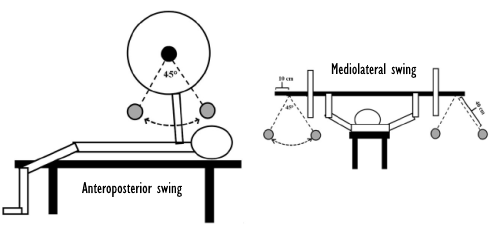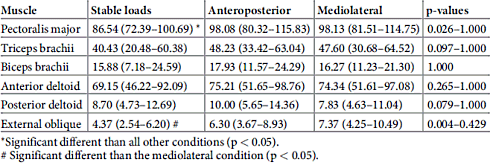Unstable weights | Bench press, only better
Sure, bench press is an excellent exercise for the chest muscles. But bench presses stimulate the pecs even better if you don't just slide some of the discs onto the bar, but tie them to the ends of the barbell with a rope. Sports scientists from Western Norway University of Applied Sciences report this in PLoS One.Study
The researchers got 17 experienced strength athletes, who have been training with weights for an average of 9 years, to bench press several times with 70 percent of the weight at which they could just manage 1 rep.
[FONT="]
[/FONT]

[FONT="]
[/FONT]
The researchers had hung a weight plate of 5 kilos with non-elastic cords of 40 centimeters on both ends of the barbell. The one time the discs (for the athlete who was bench press) swung top to bottom [anteroposterior], the other time from the inside out [mediolateral].The researchers also got the subjects to do bench presses in the regular way.
The researchers attached electrodes to the subjects' skin, which they could use to measure the electrical activity in the muscles underneath. The greater the electrical activity in a muscle during exercise, the more intensively the muscle in question is addressed.
Results
Compared to the regular bench press, bench presses with unstable weights increased electrical activity in the chest muscles by 13 percent. This increase was statistically significant.
[FONT="]
[/FONT]

[FONT="]
[/FONT]
If the weights moved in and out along the rod [mediolateral], the electrodes registered 69 percent more electrical activity in the obliques. This increase was also statistically significant.
The unstable weights had no effect on the electrical activity in the subjects' biceps, triceps and shoulder muscles.
Source:
PLoS One. 2020 Sep 17;15(9):e0239202.

|
The researchers got 17 experienced strength athletes, who have been training with weights for an average of 9 years, to bench press several times with 70 percent of the weight at which they could just manage 1 rep.
[FONT="]
[/FONT]

[FONT="]
[/FONT]
The researchers attached electrodes to the subjects' skin, which they could use to measure the electrical activity in the muscles underneath. The greater the electrical activity in a muscle during exercise, the more intensively the muscle in question is addressed.
Results
Compared to the regular bench press, bench presses with unstable weights increased electrical activity in the chest muscles by 13 percent. This increase was statistically significant.
[FONT="]
[/FONT]

[FONT="]
[/FONT]
If the weights moved in and out along the rod [mediolateral], the electrodes registered 69 percent more electrical activity in the obliques. This increase was also statistically significant.
The unstable weights had no effect on the electrical activity in the subjects' biceps, triceps and shoulder muscles.
Source:
PLoS One. 2020 Sep 17;15(9):e0239202.
